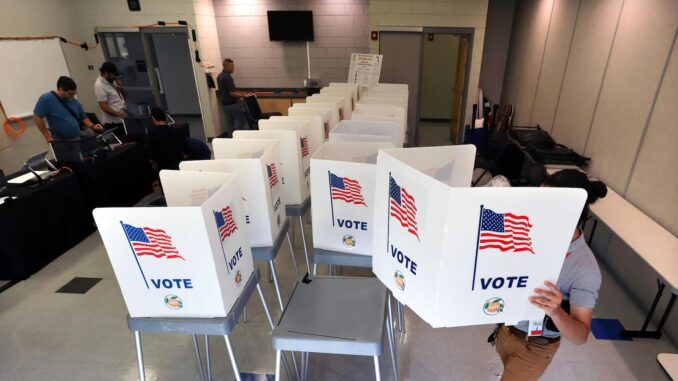
WASHINGTON — Once considered a pivotal swing state in presidential elections, Florida has proved reliably Republican in recent years. A Democrat hasn’t won the state’s Electoral College votes since 2012, when former President Barack Obama succeeded with a margin of less than one percentage point.
Republican former President Donald Trump has won Florida in both of his campaigns and the state’s 30 electoral votes are a cornerstone of his path to top Democratic Vice President Kamala Harris and return to the White House.
Trump won the state by a single point in 2016 and by three points in 2020. Republicans appeared to further tighten their grip on the state in 2022, when Gov. Ron DeSantis and Sen. Marco Rubio comfortably won reelection.
Florida voters will also choose on Election Day whether Republican Rick Scott should have another term in the U.S. Senate. Scott, a former governor of Florida, faces a challenge from Democrat Debbie Mucarsel-Powell, who represented Florida in the U.S. House but lost her reelection bid in 2020.
Further down the ballot are a handful of proposed amendments to Florida’s constitution. Amendment 4 would enshrine abortion rights in the state, while Amendment 3 would legalize the recreational use of marijuana.
Registered Democrats had outnumbered registered Republicans in Florida for at least 50 years dating back to the early 1970s. Republicans overtook Democrats in registration after the 2020 election, and that advantage grew to a lead of about 1 million voters as of August.
Election analysts will be closely watching turnout in Florida, which was pummeled by hurricanes Helene and Milton in the run-up to Election Day.
The AP does not make projections and will declare a winner only when it has determined there is no scenario that would allow the trailing candidates to close the gap. If a race has not been called, the AP will continue to cover any newsworthy developments, such as candidate concessions or declarations of victory. In doing so, the AP will make clear that it has not yet declared a winner and explain why.
Here’s a look at what to expect in the 2024 election in Florida:
Nov. 5.
7 p.m. and 8 p.m. ET. Florida covers two time zones, so most of the state will start reporting results while some voters in the panhandle are casting ballots until 8 p.m. ET.
30 awarded to statewide winner.
President: Harris (D) vs. Trump (R) vs. Claudia De la Cruz ( Socialism and Liberation) vs. Chase Oliver (Libertarian) vs. Peter Sonski (American Solidarity) vs. Jill Stein (Green) vs. Randall Terry (Constitution).
U.S. Senate: Scott (R) vs. Mucarsel-Powell (D) and three others.
Ballot measures: Amendment 3 (legalize marijuana) and Amendment 4 (right to abortion).
U.S. House, state Senate, state House, state attorney, public defender, sheriff and other ballot measures.
2020: Trump (R) 51%, Biden (D) 48%, AP race call: Wednesday, Nov. 4, 2020, 12:35 a.m. ET.
Registered voters: 13,845,913 (as of Sept. 30, 2024). About 32% Democrats, 39% Republicans and 26% unaffiliated.
Voter turnout in Nov. 2020: 77% of registered voters.
Votes cast before Election Day 2020: about 83% of the total vote.
Votes cast before Election Day 2022: about 65% of the total vote.
Votes cast before Election Day 2024: See AP Advance Vote tracker.
First votes reported, Nov. 3, 2020: 7:04 p.m. ET.
By midnight ET: about 99% of total votes cast were reported.
___
Associated Press writers Rebecca Reynolds and Maya Sweedler contributed to this report.
___
Read more about how U.S. elections work at Explaining Election 2024, a series from The Associated Press aimed at helping make sense of the American democracy. The AP receives support from several private foundations to enhance its explanatory coverage of elections and democracy. See more about AP’s democracy initiative here. The AP is solely responsible for all content.


Be the first to comment